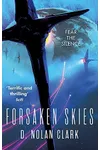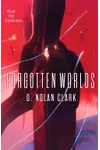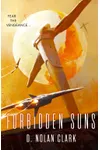Picture an American storyteller who launched a ragtag crew of pilots into the stars to face alien threats—meet D. Nolan Clark! Known for his thrilling space opera trilogy, The Silence, Clark is the sci-fi pseudonym of horror author David Wellington. His vivid worlds and complex characters have hooked readers, blending high-octane action with cosmic mysteries like the Fermi Paradox.
Beneath the pen name, Clark’s journey from a Star Wars-obsessed kid to a celebrated author is as gripping as his novels. Let’s dive into the life, works, and cosmic impact of this unique voice in science fiction!
The Making of D. Nolan Clark
Born in 1971 in Pittsburgh, Pennsylvania, David Wellington—aka D. Nolan Clark—grew up with a passion for storytelling sparked by watching Star Wars at age six. This cinematic epic fueled his dream to write science fiction. He honed his craft at Syracuse University, earned an MFA in creative writing from Penn State, and later picked up a master’s in Library Science from the Pratt Institute. Living in New York City, Wellington first made waves in horror with his Zombie trilogy, but his sci-fi alter ego, D. Nolan Clark, emerged to explore the vastness of space.
Clark’s pseudonym was a strategic move by his editors to distinguish his space operas from his horror roots, allowing him to captivate a new audience with fresh, galaxy-spanning tales. His lifelong love for authors like Robert A. Heinlein, Frank Herbert, and Iain M. Banks shaped his ambitious leap into sci-fi.
D. Nolan Clark’s Unforgettable Stories
Clark’s signature work is The Silence trilogy, a space opera that kicked off with Forsaken Skies in 2016. The story follows Commander Aleister Lanoe, a 300-year-old ex-Navy pilot, as he assembles a motley crew to defend the remote planet Niraya from alien drones. Praised for its Magnificent Seven-in-space vibe, the novel blends intense space battles with rich world-building, exploring themes like the Great Silence and humanity’s place in the cosmos.
The trilogy continues with Forgotten Worlds (2017), where Lanoe seeks the alien armada’s origins, facing mega-corporations and telepathic allies called the Choir. The finale, Forbidden Suns (2017), wraps up the epic with shocking twists, cementing Clark’s knack for cinematic storytelling. His standalone novel, The Last Astronaut (2019), nominated for the 2020 Arthur C. Clarke Award, shifts to sci-fi horror, following a mission to a mysterious alien object. Clark’s style shines through vivid descriptions of wormholes, planets, and flawed, relatable characters.
Clark’s writing balances hard sci-fi concepts with accessible, action-packed narratives. His worlds feel lived-in, with interstellar corporations and ancient alien mysteries adding depth. Fans of The Expanse or Battlestar Galactica find his blend of military sci-fi and philosophical intrigue irresistible.
Why D. Nolan Clark Matters
D. Nolan Clark has carved a niche in modern space opera, offering stories that thrill while probing big questions about humanity’s cosmic solitude. His ability to craft relatable characters in high-stakes settings has earned him a dedicated following. The Silence trilogy’s exploration of the Fermi Paradox and Great Filter resonates with readers pondering life beyond Earth, while his nomination for the Arthur C. Clarke Award underscores his growing influence.
By bridging horror and sci-fi, Clark showcases versatility, proving genre boundaries are no match for a great story. His work inspires fans to imagine bold futures and confront the unknown, making him a vital voice in speculative fiction.
- Born: April 23, 1971, in Pittsburgh, Pennsylvania
- Key Works: The Silence trilogy (Forsaken Skies, Forgotten Worlds, Forbidden Suns), The Last Astronaut
- Awards: Nominated for the 2020 Arthur C. Clarke Award for The Last Astronaut
- Influences: Star Wars, Robert A. Heinlein, Iain M. Banks
About D. Nolan Clark
Ready to blast off into a thrilling universe? Snag Forsaken Skies and dive into D. Nolan Clark’s epic space opera adventure!


